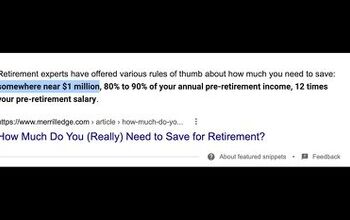How Much Do I Need to Retire? Here's How to Figure It Out

What is your number? We’ve all got one. What that means is…how much do I need to retire? The amount you’ll need to retire on is going to make or break the third chapter in your life.
Whether you’re going to continue working or live out your days on the golf course, I’ll unpack what everyone’s number really is and how to figure out your amount to retire specifically so you’re set up for success.
The one big mistake people make
Everyone thinks $1 million is going to set them up for life. That’s just not true. In reality, $5 million is the new $1 million. In another 10 years, it’s going to be more.
That’s just how inflation works. But if you’re dialing in your personal number for savings needed to retire, you have to be more specific. For example, $1 million in retirement will last you on average about 10 years if you plan to live in Hawaii.
That’s less than half of the typical retirement time span. You really need 25 years' worth of expenses ready to go in your retirement fund.
Best and worst states to retire in financially
If you realize all of a sudden that things are costing more and more, that’s inflation, and it will be a factor in your retirement savings. That’s where knowing where to retire is important.
According to CNBC, Hawaii is one of the worst states to retire in. New York and California follow as the worst states to retire in. Mississippi, Oklahoma, and Kansas are the best states to retire in because $1 million will last you more than 25 years. But, you don’t have to move states to retire.
Here’s how much you need to retire
Start with your current age and the age you want to retire. That’s your run time. Hypothetically, say you’re 25 now and want to retire when you’re 65. You have 40 years to grow your money to be ready for retirement.
Next, determine how much money you’re going to contribute each month and where it’ll be invested. This leads to understanding compounding interest. Compounding interest is your golden goose, your secret weapon, and your key to success.
With compounding interest, your money works for you over time. If you think you have to figure out what the next “big thing” is to invest in, or the next crypto, in order to double your money, just invest in assets, like index funds, and your money will double every decade.
Use a retirement calculator
Instead of going crazy doing calculations on paper, use a retirement calculator. A calculator will give you some good insights into how you should be looking at retirement in general. Once you know your number, you’re not done yet.
The second big mistake everyone makes
You have to keep adjusting your number and moving the goal at least once a year because your life is going to change. As soon as I had my first kid, my whole picture of what my retirement would look like changed.
You have to continually assess where your goal is, then have the plan to meet your goal.
Being accountable to your plan
It sounds obvious to have the plan to meet your retirement goal. But if you don’t have smart, measurable, achievable, realistic, time-bound goals on paper, you won’t be accountable.
You need someone to keep you accountable and check in with you. You also need to know you’re saving enough to retire the way you actually want to live.
Making wrong assumptions
Many people assume their retirement expenses are going to be so much lower when they retire. They don’t account for inflation and lifestyle creep (the more you make, the more you spend). You just need to know that every dollar you make and spend is working for you and not against you or your plans.
How much should you save a month?
Do you save based on a fixed percentage or a rule of thumb? The 4 percent rule for retirement savings, for example, is inefficient. (The average return that a retiree thinks they can live off of is 4 percent)
Most people are not saving enough each month to meet their goals. First, you need to know your retirement number using the calculator to determine your monthly savings plan. Then see where the gap is.
About 99 percent of the people I work with find out their number and realize what they need to save is much more than what they have already been saving. I rarely see anyone who has accidentally been saving more than they need to meet their goal.
As a general starting point, most people need to invest 15 percent of every paycheck to meet their retirement goal.
Make incremental shifts
When you see your gap, begin to increase the amount of what you put away for retirement by one percent at a time. Say you have been saving 5 percent per paycheck for retirement, but you now know you need to be saving 17 percent based on the calculations.
Don’t panic and pull the lever on selling off your home and cars! Just make incremental shifts towards saving enough for your goal. Making those shifts will probably be easier than you thought and you may even be able to save more and speed up your timeline.
Even a one percent shift can yield hundreds of thousands of dollars over the years.
How much do I need to retire?
I implore you to find your number, or how much money you need to retire. It doesn’t matter how old you are when you do this, but you need to know.
Let me know in the comments if I was able to help you understand the importance of having a good retirement plan set in motion, even if you haven’t made it out of your 20s.






















Comments
Join the conversation
My husband would never had retired if he listened to advice of others. We didn’t have major savings, we had his retirement and very small Social Security Income. He has been retired ten years and we live very comfortably. Our Trust and Faith is in God and as long as we use Wisdom we will be fine.